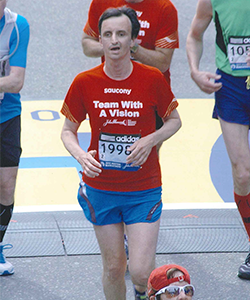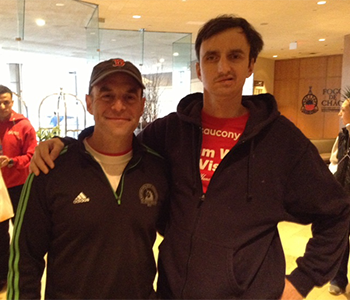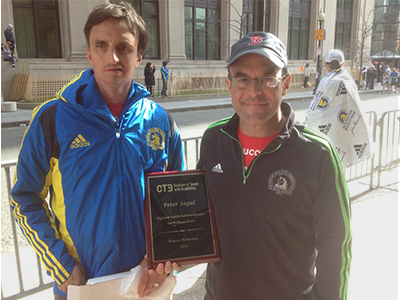Texas Runner with Visual Impairment Continually Shatters Disability Stereotypes
by Susie Angel
 |
Making change in the world doesn't always mean moving mountains. Austinite William Greer, 43, who is legally blind enacts change by simply doing what he loves: running. While he is politically active, Greer makes his most profound statement in his everyday life, demonstrating that people with disabilities can work, learn, and play anywhere and anyway they choose.
Greer is one of the lucky Austinites who was able to cross the finish line of the 117th Boston Marathon on April 15, 2013 (left). He finished the race with an official time of 4:03:54. “The first bomb went off about 5 minutes after I crossed the finish line,” Greer recalls.
Competing in the Boston marathon is a big achievement for everyone who enters the oldest and most prestigious race in the country, but for Greer it meant more. Most people don’t expect him to be an accomplished athlete because he has a traumatic brain injury (TBI) and is legally blind, but Greer always had an interest in running. As a boy in elementary school, he picked up jogging as a hobby. It wasn't until 2005, however, that he got serious about running, incorporating it into his routine. At first, he ran different routes near his home. Before long, he was venturing out of his neighborhood and running seven miles almost every day.
Greer acquired his disability when he was in a serious bicycle accident during January of his junior year in high school. “I am not sure how long I was in a coma. I know that I was unable to communicate with the EMT, doctors, and nurses who found me and operated on me post accident,” he explains.
His injuries were so bad that doctors didn’t expect he would ever pull through. Luckily, the closest hospital to the scene of his accident employed one of the few neurosurgeons in the nation who actually had the skills necessary to save his life. Greer was told that he would have died on the operating table if he had been taken to any other hospital. As he was recovering, his body was forced to work so hard to ward of diseases that it began burning away fat and even muscle. At one point, he only weighed 78 pounds. After he awoke from his coma, Greer gradually recovered after many long days of intensive physical, occupational, and speech therapies.
Greer went on to finish high school and graduate from Kenyon College with a BA in Political Science in 1994. He had several jobs working as an intern for Alan K. Simpson, the minority whip in the US Senate in 1992; a campaign volunteer for Chris Jacobs, a candidate for the Erie County Legislature in 1995; a temporary worker in the accounting department of University of Texas at Austin in 2000-01; and a substitute teacher for the Austin Independent School District in 1998-2000 and 2001-03.
It wasn’t until 2003 that Greer finally found his place as the IT Specialist/Webmaster at the Coalition of Texans with Disabilities (CTD), a non-profit advocacy and consumer awareness organization based in Austin. “William is one of the hardest workers that I know. He started with us as a volunteer for two years and he’s been with us for 10 years now,” said Dennis Borel, the Executive Director of CTD. One year after joining the team, Greer founded CTD’s Cinema Touching Disability Film Festival, a public awareness and fund raising project. He remains the festival's coordinator as it enters its tenth year this fall. Under his direction, the festival has grown to include an international Short Film Competition for students and emerging filmmakers, appearances by film stars and directors, and multiple nights of screenings.
In 2007, Greer entered his first race, the Piece of Mind 5K in Austin. It was hosted by The Brain Injury Association of Texas to raise money for veterans who had returned from Iraq with head injuries. He ran in honor of his brother who was serving one of his many tours in Iraq at the time. Since then, Greer has run in countless 5 and 10Ks and seven full marathons, including this year’s Boston Marathon.
In some of his early races, Greer used a sighted guide to help him navigate his way through the courses. He had the sighted guide run in front and to his left because that is where he has the most peripheral vision. He quickly realized that he could do without one, as he is able see enough shapes and shadows to maneuver through a course. Besides, Greer discovered, sighted guides that can keep pace with him are hard to find. Boston was a different story, however. Between an unfamiliar route and an overwhelming number of fellow runners, Greer felt like he needed a guide. He also wanted to make sure he could read the mile markers.
 |
In order to find a sighted guide, Greer contacted the Boston Athletic Association, who put him in touch with Team with a Vision, a running initiative out of the Massachusetts Association for the Blind and Visually Impaired. Team with a Vision hooked Greer up with Peter Sagal (right). Sagal is an American playwright, screenwriter, actor, and best known as being the host of NPR’s game show “Wait Wait... Don't Tell Me!” He is also an experienced marathon runner who had never served as a sighted guide before.
Greer and Sagal made a pretty good team. Greer could immediately tell Sagal was different from most sighted guides. While they were walking to get their bibs and preparing for the start of the marathon, Greer noticed how Sagal was already observing what he could see and what he would need assistance with. This made him feel more comfortable. CTD recognized Sagal's service with a "Sighted Guide Extraordinaire for William Greer” plaque (below).
The morning of April 15th was beautiful. It was perfect running weather and Greer and Sagal got off to an ambitious start, averaging 8:30 minute miles for over half of the marathon. For encouragement, Greer took in the loud sounds of the yelling and cheering crowds, one of his favorite things about running races. Near the end of the course, two Boston College students approached Greer and Sagal to find out about their partnership and even ended up running with them for about a mile.
In a split second, the mood of the marathon went from excitement and celebration to confusion and total chaos. About 100 yards passed the finish line, Sagal and Greer were in the finishers' tent picking up Greer’s medal when they heard the first explosion. “We had no idea what happened because marathon officials didn’t tell us anything; they just told us to keep going,” Greer describes.
 |
"…Thanks to William for gutting out that final mile at a run. If he hadn't, we would have crossed the line just as the bomb went off." -- Peter Sagal, @peterruns.
In the moments after the blasts, finishers received bits and pieces of information about what happened, but remained largely uncertain. It was an hour, when some of the runners were able to pull up news stories on their phones and iPads, before they started learning details of the day’s events. They didn’t get the entire story until they were in front of a television, and even then, there were many contradictory stories.
Two days after this historic event, Greer returned to Austin to share his experiences, good and bad, with all his family and friends. Even though the day ended in tragedy, he will never forget the feeling he had when he crossed that finish line. He publicly vowed: "This tragedy will not keep me from running Boston again."
More news coverage of William and Peter in Boston:


